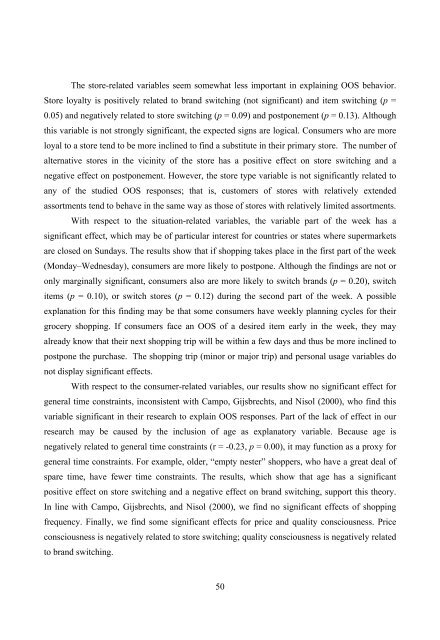Understanding Consumer Reactions to Assortment Unavailability
Understanding Consumer Reactions to Assortment Unavailability
Understanding Consumer Reactions to Assortment Unavailability
You also want an ePaper? Increase the reach of your titles
YUMPU automatically turns print PDFs into web optimized ePapers that Google loves.
The s<strong>to</strong>re-related variables seem somewhat less important in explaining OOS behavior.<br />
S<strong>to</strong>re loyalty is positively related <strong>to</strong> brand switching (not significant) and item switching (p =<br />
0.05) and negatively related <strong>to</strong> s<strong>to</strong>re switching (p = 0.09) and postponement (p = 0.13). Although<br />
this variable is not strongly significant, the expected signs are logical. <strong>Consumer</strong>s who are more<br />
loyal <strong>to</strong> a s<strong>to</strong>re tend <strong>to</strong> be more inclined <strong>to</strong> find a substitute in their primary s<strong>to</strong>re. The number of<br />
alternative s<strong>to</strong>res in the vicinity of the s<strong>to</strong>re has a positive effect on s<strong>to</strong>re switching and a<br />
negative effect on postponement. However, the s<strong>to</strong>re type variable is not significantly related <strong>to</strong><br />
any of the studied OOS responses; that is, cus<strong>to</strong>mers of s<strong>to</strong>res with relatively extended<br />
assortments tend <strong>to</strong> behave in the same way as those of s<strong>to</strong>res with relatively limited assortments.<br />
With respect <strong>to</strong> the situation-related variables, the variable part of the week has a<br />
significant effect, which may be of particular interest for countries or states where supermarkets<br />
are closed on Sundays. The results show that if shopping takes place in the first part of the week<br />
(Monday–Wednesday), consumers are more likely <strong>to</strong> postpone. Although the findings are not or<br />
only marginally significant, consumers also are more likely <strong>to</strong> switch brands (p = 0.20), switch<br />
items (p = 0.10), or switch s<strong>to</strong>res (p = 0.12) during the second part of the week. A possible<br />
explanation for this finding may be that some consumers have weekly planning cycles for their<br />
grocery shopping. If consumers face an OOS of a desired item early in the week, they may<br />
already know that their next shopping trip will be within a few days and thus be more inclined <strong>to</strong><br />
postpone the purchase. The shopping trip (minor or major trip) and personal usage variables do<br />
not display significant effects.<br />
With respect <strong>to</strong> the consumer-related variables, our results show no significant effect for<br />
general time constraints, inconsistent with Campo, Gijsbrechts, and Nisol (2000), who find this<br />
variable significant in their research <strong>to</strong> explain OOS responses. Part of the lack of effect in our<br />
research may be caused by the inclusion of age as explana<strong>to</strong>ry variable. Because age is<br />
negatively related <strong>to</strong> general time constraints (r = -0.23, p = 0.00), it may function as a proxy for<br />
general time constraints. For example, older, “empty nester” shoppers, who have a great deal of<br />
spare time, have fewer time constraints. The results, which show that age has a significant<br />
positive effect on s<strong>to</strong>re switching and a negative effect on brand switching, support this theory.<br />
In line with Campo, Gijsbrechts, and Nisol (2000), we find no significant effects of shopping<br />
frequency. Finally, we find some significant effects for price and quality consciousness. Price<br />
consciousness is negatively related <strong>to</strong> s<strong>to</strong>re switching; quality consciousness is negatively related<br />
<strong>to</strong> brand switching.<br />
50

















